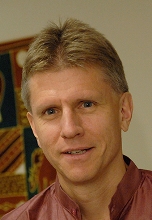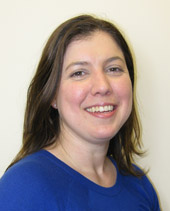BUSPH-based Global Health Center Gets $8.5 Million Grant to Combat Neonatal Mortality
BU’s Center for Global Health and Development, based at the School of Public Health, has won an $8.5 million grant from the Bill & Melinda Gates Foundation for a project that will test simple, low-cost methods that could save many of the 4 million newborns who die each year in the world’s poorest countries.

The four-year grant will allow a team of center researchers, headed by David Hamer, MD, associate professor of international health, to test whether an antiseptic wash can reduce infections of the umbilicus in the month after birth and prevent the deaths of newborns from those infections. The large-scale trial will be undertaken in the African nation of Zambia, where BUSPH researchers have worked on other studies aimed at reducing neonatal mortality.
“I’m so pleased to be able to announce this grant,” said Jonathon Simon, the center’s founding director. “For all of the progress that’s been made worldwide in reducing deaths in children, there’s been much less progress for ‘neonates,’ meaning the first 28 days of life. We’re hoping to change that.”
The research team will use the grant to study whether the use of an antiseptic wash called chlorhexidine to clean the umbilicus stump of newborns (the small piece of umbilical cord that remains for about a week after the cord is cut at birth) will improve neonatal survival rates. More than 28,000 women in the southern province of Zambia will be recruited for the study, and researchers will compare infant survival rates for those who receive the intervention with those who don’t.
Hamer said he began discussions with the Gates Foundation about the chlorhexidine study months ago, while he and other researchers were completing another study in Zambia known as LUNESP (Lufwanyama Neonatal Survival Project). That project trained Zambian women who serve as traditional birth attendants in resuscitation and other simple interventions aimed at preventing neonatal mortality.
Hamer said the chlorhexidine trial will involve training traditional birth attendants, as well as staff at a health facility and expectant mothers, in using the antiseptic. The five districts being studied in southern Zambia, spread around the town of Choma, have very basic health facilities, and the majority of births take place in the home.
“We’re doing this in a very practical way so it can be easily applied in a community and household setting,” he said of the intervention.

Besides Hamer, who is an infectious diseases specialist, the research team will include epidemiologist Katherine Semrau and pediatric global health fellow Julie Herlihy. Simon and Donald Thea, MD, professor of international health, will oversee the project.
Hamer said that while much progress has been made in the last decade in reducing mortality among children under the age of 5, deaths in the first 28 days have been harder to prevent, especially in poor areas of the world. About 40 percent of the deaths of children under 5 occur in the first month of life, he noted. Zambia has one of the highest neonatal mortality rates in Africa.
Cord cleaning with chlorhexidine has been studied in Nepal and Bangladesh, but this is the first such study in Africa. A companion study will be conducted simultaneously in Tanzania by another university to expand the scope of the research, Hamer said.
“We are grateful for the support of this marvelous project,” said BU President Robert A. Brown. “This study is indicative of the quality and impact of the research and outreach that is underway in the Center for Global Health and Development.”